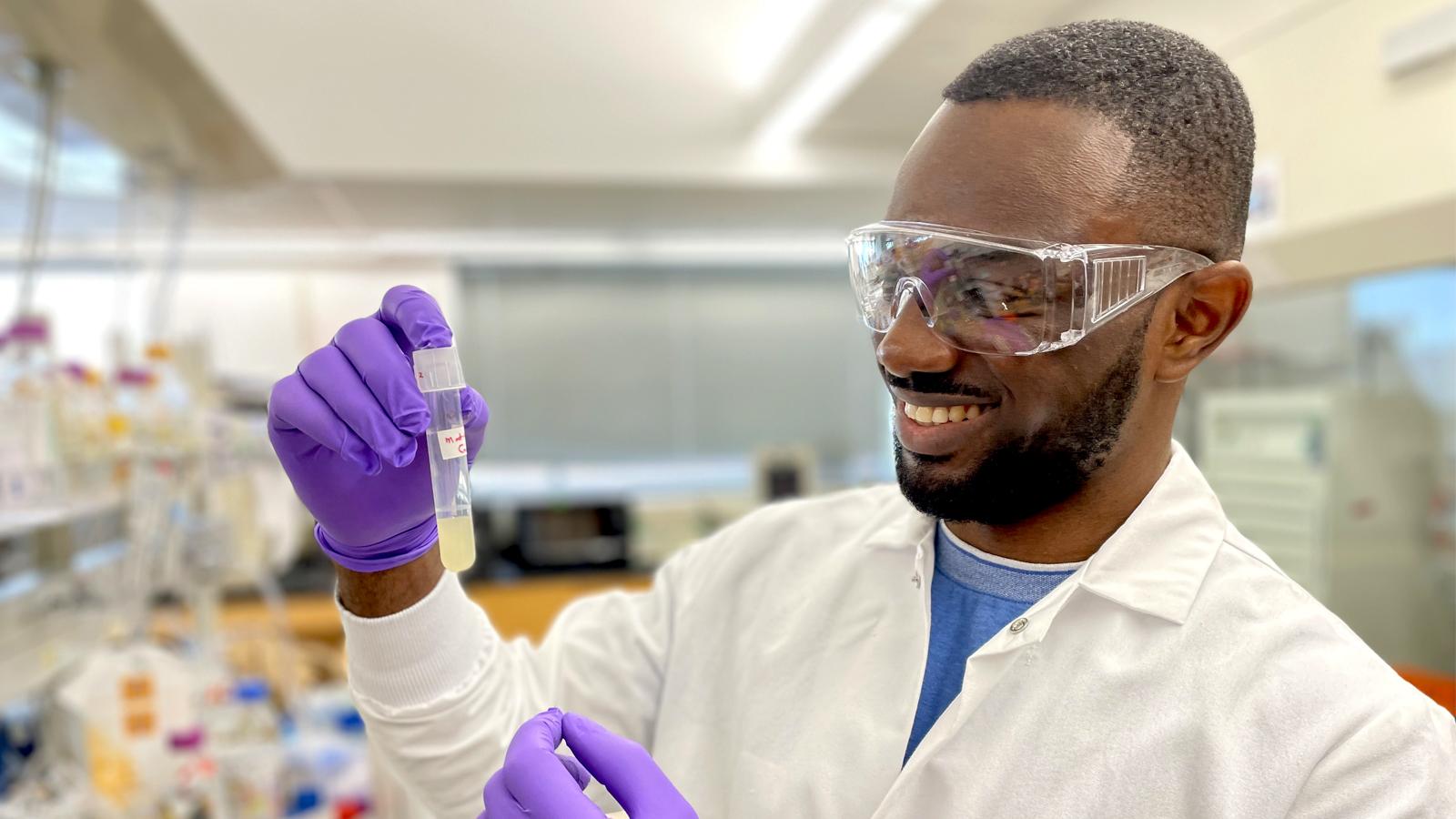February 15, 2024

Steve Eshiemogie, a doctoral student studying chemical and biological engineering at Rensselaer Polytechnic Institute, has been recognized as an honorable mention in the annual Cell Press Rising Black Scientists Awards for his essay “From village to lab: An African scientist’s quest for a sustainable future.” [MS1] More than 350 students across a range of scientific disciplines applied.
This accolade from a prominent scientific journal puts the long days working in the lab into a new perspective, Eshiemogie said.
“To be selected for this award means a lot to me. It means that what I do is appreciated and valued. People in the scientific community are interested in what I’m doing, and that makes me want to keep pushing,” he said.
Growing up in a small village in Nigeria, Eshiemogie didn’t have many role models when it came to pursuing higher education. Eshiemogie is an outlier, earning his bachelor’s degree in chemical engineering from the University of Benin in his home country and moving across the Atlantic for a Ph.D. in the United States.
“Where I come from, not everyone goes to school, and if they do, they stop after high school. I would think ‘How can I change that? How can I make more people interested in going to school?’’’ he said. “One way to do that that would be to go to school myself. That was one reason I applied for this award: To show people where I come from how far I can go and for people like me to see they can do this too.”
In addition to leading by example, Eshiemogie hopes his research career will allow him to give back to his community.
He is already taking steps toward that goal in the lab of Mattheos Koffas, his doctoral adviser. There, Eshiemogie is part of a research collaboration with Vidhya Chakrapani’s lab that converts carbon dioxide, a greenhouse gas, into organic acids and feeds those acids to bacteria engineered to convert them into high-value compounds.
Taking a waste product and turning it into something useful would transform many people’s lives in Nigeria and beyond, Eshiemogie said.
“In Africa, we have a lot of waste, but we don’t have the technology to utilize this waste. I want to contribute my skills and my expertise in this area. I am also very interested in ways to generate clean energy in places where there are a lot of power outages and the grid is unstable, which is the case for my family back home,” Eshiemogie said.
During his research journey, Eshiemogie has encountered his fair share of challenges.
As an international student studying for the first time in the United States, he had to adjust to life thousands of miles away from friends and family, “and because of the issues with electricity, I can’t always talk to people back home,” he said.
Life in the U.S. wasn’t the only unfamiliar territory he had to navigate. Trained as a chemical engineer, Eshiemogie was suddenly in a new world of bacteria and genetics in Koffas’ lab. “The learning curve was steep, but I was so fascinated by the research happening in Dr. Koffas’ lab, I was ready to do the work,” he said.
Fortunately, Koffas and Eshiemogie’s lab mates were there to support him and get him up to speed. Today, he loves soaking up new skills and knowledge and turning that into success in the lab.
“Before coming to RPI, I did not have a strong biology background. I had never cultured a cell. But Dr. Koffas, he assured me, ‘You can learn everything here.’ Now seeing my cells grow is my favorite part of my work because, when they grow, it means that the experiment worked,” Eshiemogie said.
“I can remember when Steve first came to my office to talk about research about two years ago,” said Koffas, Dorothy and Fred Chau ʼ71 Career Development Constellation Professor in Biocatalysis and Metabolic Engineering and a member of the Center for Biotechnology and Interdisciplinary Studies at RPI. “He impressed me with his ambition and passion to work on something that would make an impact on some real existential problems humanity is faced with, such as waste and development of alternative energy sources. His project is doing exactly that: we use a combination of electrolysis, catalysis, and bioengineering to convert greenhouse gases, such as CO2 and methane, to chemicals that are currently produced from fossil fuels.”
After earning his Ph.D., Eshiemogie plans to stay in the United States and work in the biotechnology industry to grow further as a scientist and engineer. He hopes to eventually return home to Nigeria to implement what he has learned and invest in a sustainable future for his country.